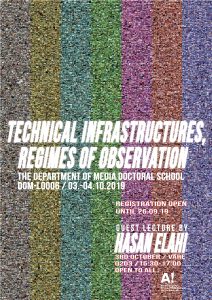Technical infrastructures, regimes of observation
Department of Media / Doctor of Arts School 2019
During recent years there has been an intensive debate regarding the impact of digital media in the lives of citizens. Nevertheless, the discussion regarding the qualitative distinctions between the different infrastructures supporting computation devices and media formats remain mostly the purview of engineers and computer scientists. Very little is said about the impact of new cultural and social ‘image environments’ for example where digitization and computing play a big role. The objective of this doctoral school is, from the perspective of arts and design, to discuss and reflect on about the notion of ubicomp – or ‘ubiquitous’ computing that is present everywhere and all the time.
In contrast to desktop computing, ubiquitous computing is the term used since the late 1990s and early years of the millennium to describe the new forms of applications and interaction emerging as a result of 1) the increase in capacity of memory handling and computation power of micro-processors together with 2) the miniaturization of computing devices which allows for their embedding into the fabric of everyday life. Some of the questions to be discussed are:
1. What is the ubicomp paradigm? What are some of its key aspects? How does it affect our everyday life?
2. How has the shift towards ubicomp paradigm affected creative production in media, art and design practices
3. Drawing from a selected sample of ubicomp applications. What can we say about its negative as well as positive contributions?
Keywords: Big data, citizens journalism, interactive visualizations, distributed interfaces, pervasive computing, surveillance culture, social media.
DOWNLOADS
READING LIST
- The Elephants in the (Server) Room: Sustainability and Surveillance in the era of Big Data. Simon Penny. http://simonpenny.net/2010Writings/Ekman_elephant_final.pdf
- Cutting and Folding the Borgesian Map. Film as Complex Temporal Object in the Industrialization of Memory, Patricia Pisters ( Emailed)
- Peekaboo, I See You!About Observation, Surveillance, and Human Agency in the Age of Ubicomp, Lily Diaz ( Emailed)
- (IN)Visibility, (UN)Awareness, and A New Way of Seeing Through Complex Cinema.Maria Poulak (PDF. Emailed)
- http://kauppinen.net/tomi/contextual-information-gio2015.pdf
- http://kauppinen.net/tomi/AW4city2018.pdf
- http://kauppinen.net/tomi/kauppinen-et-al-smartmuseum-2009.pdf

